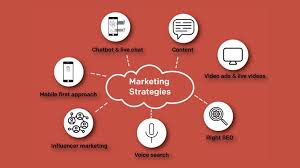What Are Social Media Marketing Strategies?
In today’s digital world, social media marketing is a crucial part of any brand’s strategy. Businesses of all sizes use social media to connect with people, grow their brand, and increase sales.
Understanding Social Media Marketing
Social media marketing uses platforms like Facebook, Instagram, and TikTok to promote products, engage with people, and build loyalty.
Unlike traditional ads, social media marketing lets businesses interact directly with their audience, helping them better understand customer preferences, trends, and behaviors.
Why Is Social Media Marketing Important?
1. Reach a Broader Audience: Social media platforms have billions of users worldwide. A strong social media strategy helps businesses reach a global audience and connect with new customers.
2. Targeted Advertising: One of the key benefits of social media marketing is its precise targeting. Businesses can tailor their marketing efforts based on demographics, interests, behaviors, and more.
3. Increased Engagement: Social media interactions like comments, likes, shares, and messages help businesses connect personally with their followers.
4. Cost-Effective: Social media marketing is often more affordable than traditional advertising. Paid campaigns can fit any budget, and free strategies can deliver great results over time.
What Is a Social Media Marketing Strategy?
A social media marketing strategy outlines a brand’s goals, tactics, and metrics to measure success on social platforms. It’s a plan for using social media to increase brand awareness, get leads, or drive sales.
Creating an effective social media marketing strategy involves several key steps:
1. Setting Clear Goals
Before starting social media marketing, it’s important to set clear, measurable goals. These goals should align with the overall business objectives. Common goals in social media marketing include:
– Increasing Brand Awareness: Using social media to enhance the visibility of your brand.
– Driving Traffic to Your Website: Encouraging users to visit your site through links in posts or ads.
– Generating Leads or Sales: Using targeted campaigns to attract potential customers or promote a product.
– Fostering Engagement: Creating content that encourages users to comment, like, and share.
2. Identifying Your Audience
Understanding who your target audience is will shape your entire social media marketing strategy. This includes knowing their demographics (age, gender, location) as well as their interests, needs, and pain points. For instance, a B2B company may focus more on LinkedIn, while a fashion brand might prioritize Instagram or TikTok.
3. Choosing the Right Platforms
Not all social media platforms are equal. Each platform attracts different audiences and supports different content formats. It’s important to select the platforms that best match your brand and audience. Here’s a brief overview:
– Facebook: Best for broad audiences and detailed targeting.
– Instagram: Best for visually-focused brands and businesses aiming at younger audiences.
– Twitter: Effective for real-time updates and engaging with customers through hashtags.
– LinkedIn: Perfect for B2B marketing and professional networking.
– TikTok: Excellent for engaging younger audiences through short-form video content.
4. Developing a Content Strategy
The heart of any social media marketing strategy is content. Content should be customized for each platform while staying consistent with your brand voice. Key types of content include:
– Visual Posts: Images and infographics that are shareable and visually appealing.
– Video Content: One of the most engaging forms of content, including live videos, stories, and short clips.
– User-Generated Content (UGC): Encouraging followers to create content related to your brand, which boosts credibility and trust.
– Polls and Surveys: Interactive content that allows you to gather insights from your audience
5. Implementing Paid Advertising
While organic social media marketing is effective, incorporating paid ads can enhance visibility and reach. Paid campaigns help businesses reach specific audiences and achieve goals like website traffic, app installs, or direct sales.
Paid social media marketing strategies can include:
– Facebook Ads: These offer robust targeting options based on demographics, interests, and behaviors.
– Instagram Sponsored Posts: Perfect for visually-driven ads targeting younger users.
– LinkedIn Ads: Ideal for reaching decision-makers in the business world.
6. Engaging with Your Audience
Social media marketing isn’t just about broadcasting your message; it’s about creating conversations. This is where engagement plays a key role. Businesses need to respond to comments, messages, and mentions to build loyalty and create a community around their brand.
7. Measuring and Optimizing Performance
No social media marketing strategy is complete without tracking key metrics to evaluate success. Tools such as Google Analytics, Facebook Insights, and Instagram Analytics offer valuable data on reach, engagement, and conversions. Key performance indicators (KPIs) to monitor include:
– Engagement Rate: Measures how users are interacting with your content.
– Click-Through Rate (CTR): Tracks the number of users clicking on links within your posts.
– Conversion Rate: Measures the number of users taking a desired action (e.g., making a purchase).
Best Practices for an Effective Social Media Marketing Strategy
1. Be Consistent: Posting regularly and using a consistent brand voice builds trust and keeps people engaged.
2. Use Influencers: Working with influencers can spread your brand message and reach new audiences.
3. Keep Up with Trends: Social media trends change fast. Keeping up with the latest trends, such as meme culture or short-form videos, can help your brand remain relevant.
4. Try Different Strategies: Experiment with posting times and ad variations to improve your strategy over time.
Conclusion
Social media marketing strategies are indispensable for modern businesses aiming to expand their digital presence. By setting clear goals, understanding the audience, creating engaging content, and regularly analyzing performance, businesses can effectively harness the power of social media marketing. To boost brand awareness or drive sales, a solid social media marketing strategy is essential for success today.






